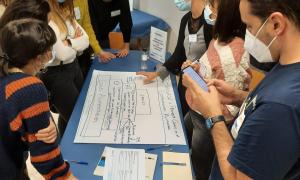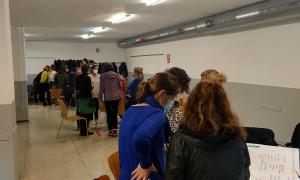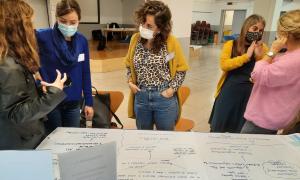More than 20 organisations collaborate as a network to improve the model for promoting healthy and sustainable food in Barcelona

The IrsiCaixa Living Lab, within the framework of the Barcelona CaixaResearch Living Lab, has organised a networking session to define initiatives and organise the implementation of actions to improve nutrition in the neighbourhood of La Verneda i La Pau
The current model for promoting healthy and sustainable food presents multiple challenges in the health, environmental and socio-economic spheres. These challenges, which include problems such as changes in eating habits related to the new lifestyles of the population, the increase in overweight, environmental degradation or the increase in global demand for food, among others, are characterised by being complex and persistent. For this reason, the change in the model for promoting healthy and sustainable food cannot be tackled with a single solution, but rather collective actions are needed to bring together different perspectives and find systemic responses to the challenge. Given this approach, the Living Lab for Health at IrsiCaixa, within the framework of the Barcelona CaixaResearch Living Lab - promoted by "la Caixa" Foundation and Barcelona City Council - is carrying out the Fit4FoodBcn project, which has facilitated reflection processes with more than 136 professionals from 64 organisations to develop a Strategic and Collective Action Plan to facilitate the transformation of the model for promoting healthy and sustainable food. This plan is currently focused on the neighbourhood of La Verneda i La Pau and, in the future, aims to be deployed in other neighbourhoods of Barcelona. With the aim of defining the initiatives and organising the implementation of this action plan, on 22 November IrsiCaixa's Living Lab for Health organised a networking session with 26 professionals from 19 different organisations, both from the neighbourhood of La Verneda i La Pau, Barcelona and the surrounding area.
Identifying challenges in order to agree on a vision for the future
In order to come up with initiatives that respond to the complexity of the different challenges, it is first necessary to understand what the main problems are and how to address them. "Analysing the situation on such complex issues is not easy, but it is fundamental. In order to tackle the problem, we need to move away from our personal perspective and take a global view. To achieve this, it is necessary to involve a wide range of people from inside and outside the academic environment and to have representatives from different areas of the system, organisational levels and geographical areas," stresses Rosina Malagrida, head of the Living Lab for Health at IrsiCaixa and co-coordinator of the Barcelona CaixaResearch Living Lab. To this end, the Living Lab team organised meetings with more than a hundred participants in which, using systemic innovation methodologies, they mapped out the problems and opportunities of the current model for promoting healthy and sustainable food, prioritising the most important ones. The main obstacles detected have been grouped into 5 limiting factors where there is the greatest need for change: lack of participatory and fragmented decision-making, lack of prioritisation and equity in the model of promoting healthy and sustainable diets, low food literacy, lack of accessibility to personalised and systemic information and education and, finally, lack of accessibility, availability and affordability of healthy and sustainable food. To address this set of challenges, a shared vision of the future has been defined and, based on these collaborative analyses, the objective of the Fit4FoodBcn/La Verneda i La Pau Network has been agreed upon. This objective is to implement a model of healthy and sustainable food in which decision-making is collaborative and from a global vision, facilitates spaces for collaboration, reflection and co-creation with the different stakeholders, develops a sustainable and scalable network at different levels and neighbourhoods of the city, promotes changes in the food sector and at the individual level, and contributes to putting the promotion of healthy and sustainable food at the centre of the political agenda and that of other social actors.
Working session to validate the strategy and establish future actions
The last step of the ideation process is a networking session, held on Monday 22 November, which has allowed the initiatives present in the Strategic and Collective Action Plan to be concretised, and thus move towards the implementation phase. During this session, the participants drew up a summary to explain the main ideas of the action plan and then organised themselves into innovation groups to finish defining the future actions in a collaborative way through participatory dynamics. "The activity consisted of debate and reflection between the different groups to establish synergies and validate initiatives to improve the promotion of healthy and sustainable food," explains Marina Pino, project manager of the Living Lab for Health at IrsiCaixa. "What would a future model of food promotion that responds to the complexity we have described look like? This is what we want to solve together. Sessions like these allow us to develop innovation programmes and plan the necessary actions to implement the vision of the future that we have collaboratively defined", she concludes.
The next step of the Fit4Food project is the co-creation of prototypes, i.e. the design of the first examples of solutions that, after an iterative process of validation and implementation, will facilitate changes in the model for promoting healthy and sustainable food in the neighbourhood of La Verneda i La Pau.


